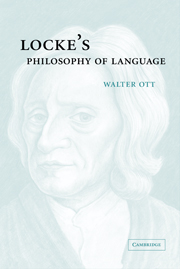Book contents
- Frontmatter
- Contents
- Acknowledgements
- Note on textual references
- Introduction
- 1 Signs and signification
- 2 Particles and propositions
- 3 Essence and abstraction
- 4 Locke contra the Aristotelians: signification and definition
- 5 Beyond the bounds of sense?
- 6 The reception of Locke's philosophy of language
- 7 Conclusion
- Bibliography
- Index
7 - Conclusion
Published online by Cambridge University Press: 22 September 2009
- Frontmatter
- Contents
- Acknowledgements
- Note on textual references
- Introduction
- 1 Signs and signification
- 2 Particles and propositions
- 3 Essence and abstraction
- 4 Locke contra the Aristotelians: signification and definition
- 5 Beyond the bounds of sense?
- 6 The reception of Locke's philosophy of language
- 7 Conclusion
- Bibliography
- Index
Summary
Although something has been done above to situate Locke in a contemporary context, the reader may well wonder about the importance of all of this for the contemporary philosopher. What, when all is said and done, does Locke have to say to us?
By way of at once answering this question and drawing together the threads of this project as a whole, I shall step back for a moment from the details of Locke's view and ask whether an approach to language on Locke's lines is viable. As I indicated at the outset, I fully expect philosophers who have felt the twin influences of Frege and the Kripke/Putnam view of reference to be hostile to Locke's position. The claim that one's mental representations fix the reference of one's words is controversial enough; the additional claim that at bottom there is no such thing as reference is apt to sound paradoxical. It would be well to begin our assessment of Locke, then, by examining Putnam's arguments against the broadly Lockean position that meaning is a matter of mental representation.
Having argued that Locke's approach has the resources to answer these arguments and that mental representations can plausibly be said to mediate the word/world connection, I go on to assess the particular relations and mechanisms Locke thinks connect a (categorematic) word and a mental representation on one hand and such a representation and the world on the other.
- Type
- Chapter
- Information
- Locke's Philosophy of Language , pp. 138 - 149Publisher: Cambridge University PressPrint publication year: 2003



